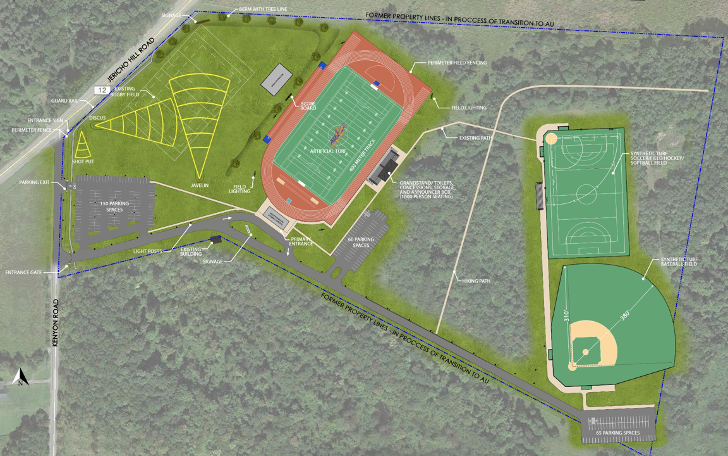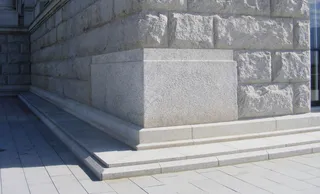See the initial drawing of new expansion at AU
ALFRED, NY – Alfred University this week announced ambitious plans to develop a new sports complex atop Jericho Hill in the Town of Alfred. The “Saxon Hill” project, estimated to cost $18-20 million, will increase the University’s intercollegiate athletic offerings, boost student recruitment and retention efforts, and significantly increase enrollment.
The University’s Board of Trustees on July 19 unanimously approved moving the project to the design phase. The Saxon Hill complex will be located on 40 acres on the University-owned Jericho Hill property at the corner of Jericho Hill Road (Allegany County Road 12) and Kenyon Road, about 1.8 miles south of campus. Clark, Patterson, and Lee, a Buffalo-based architecture, engineering, and planning firm, will develop the project design.

“The Saxon Hill project, once complete, will dramatically enhance the student experience at Alfred University,” commented Mark Zupan, Alfred University president. “Our Board of Trustees deserves credit for making this important commitment, which benefits all our students—athletes and non-athletes alike.”
“The Saxon Hill athletic facility will be impactful on the entire student experience here at Alfred University,” added Paul Vecchio, director of athletics. “These facilities will provide expanded opportunities for club teams and intramurals as well as recreational space for our entire campus community. I am excited about how Saxon Hill will complement the wonderful options that already exist with our world-class Equestrian Center and Foster Lake. All three recreational spaces will lie within 1.5 miles of each other and form unique experiences that few Universities within our region can offer.”
The Saxon Hill project will:
- Add two turf fields, a baseball diamond, an outdoor track, and additional softball playing facilities, which will support the University’s existing intercollegiate football, men’s and women’s soccer, men’s and women’s lacrosse, and men’s and women’s track and field programs
- Enable the addition of new sports, such as field hockey, baseball, archery, women’s rugby, and men’s volleyball
- Provide enhanced opportunities for cross country, track and field, and intramural and club sports
- Provide regular shuttle service between the Saxon Hill complex and campus
- Increase student prospect visits, recruitment, and retention rates for the University
- Realize an additional 125 more students each academic year
- Continue to build upon the student opportunities already in place on Saxon Hill, which include Alfred University’s world-class Equestrian Center and Foster Lake recreational area
Initial Saxon Hill conceptualization
Vecchio noted that the new sports complex will make it much easier to accommodate practice times for a growing number of teams. Currently, all teams (football, men’s and women’s soccer, men’s and women’s lacrosse) that use Yunevich Stadium at Merrill Field, the University’s lone on-campus turf field, must share that facility. Practices can at times run as late as 11 p.m.; the Saxon Hill facility, with two turf fields, will allow for a more normalized schedule for practices.
“For our athletic department, we are excited to leverage the recruiting opportunities that a vibrant and competitive Division III program provides to our campus by not only enhancing the experiences for our current student-athletes, but also bringing over 100 more students to discover all that Alfred University has to offer,” Vecchio said. “Our assortment of facilities will not only enrich the lives of our student-athletes but also enhance community opportunities through camps, clinics and outside tournaments and meets, thereby providing additional opportunities to showcase Alfred University’s ‘Outside of Ordinary’ experiences.”
The design phase of the project, which includes finalizing architectural plans and securing the necessary permitting needed for construction, is expected to last 10-12 months. Once a design is finalized and approved, construction would take approximately one year.
The total cost for the complex is estimated to be between $18 million and $20 million. Philanthropy will play a key role in providing the necessary funding. The University has already received $3.25 million in gifts given or committed, along with an additional $1 million bequest dedicated to maintenance of the complex.






